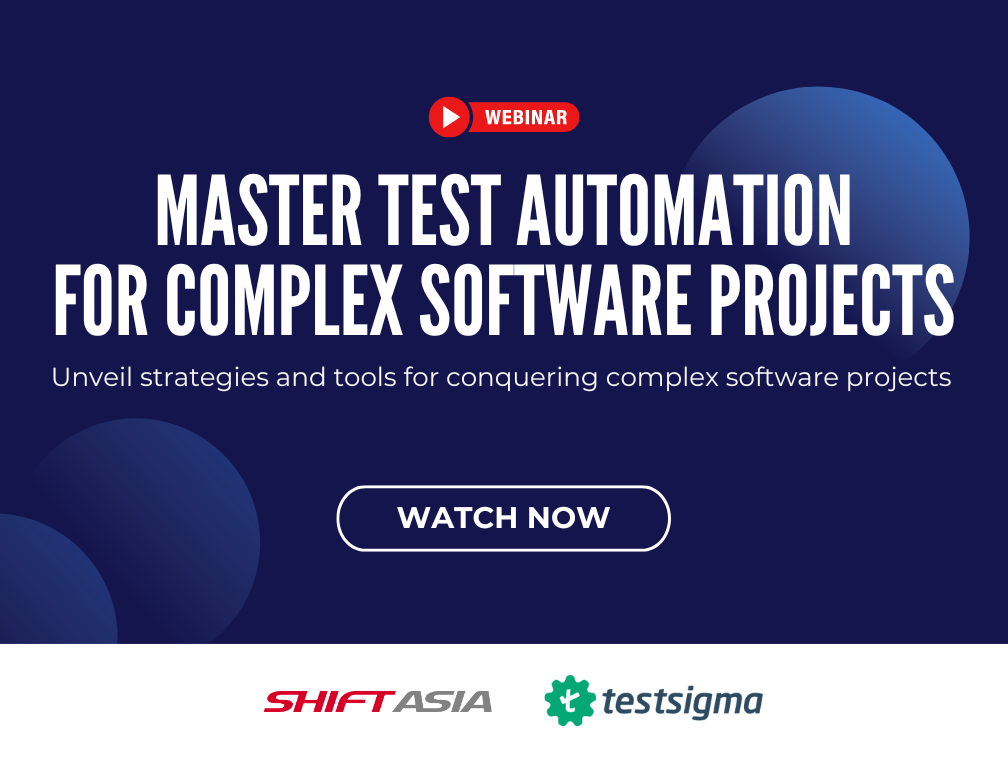Automated testing frameworks prove to be a valuable resource for developers aiming to evaluate the functionality and dependability of software. By handling repetitive and tedious tasks, such as testing login processes and menu functionalities, these frameworks are best at detecting potential issues at an earlier stage of development. This proactive approach significantly contributes to elevating the overall quality of the final product. Consequently, organizations are consistently looking for dependable and efficient test automation frameworks, driven by the desire to save both time and resources. The challenge occurs when faced with a plethora of options in the market, requiring careful consideration to start digging into the most fitting framework based on specific testing needs.
To aid you in navigating such a hurdle, we’ve compiled a comprehensive guide featuring the top 10 test automation frameworks. These frameworks are equipped with diverse features and compatible with various programming languages, making them well-suited for multiple applications. By incorporating these frameworks into their workflow, software development teams can enhance testing efficiency, minimize the likelihood of errors, and ultimately elevate the overall quality of their software.
By the end of this article, we hope you find what you come looking for!
What is a Test Automation Framework?
The test automation framework serves as a set of principles or guidelines guiding the creation and design of test cases. Comprising a mix of practices and tools, it is specifically crafted to enhance the efficiency of QA professionals. These guidelines include coding standards, methods for handling test data, object repositories, processes for storing test results, and information on accessing external resources. While these aren’t obligatory rules, testers still have the option to script or record tests without strictly adhering to them. However, opting for an organized framework typically brings additional benefits that might be overlooked.
Different Types of Test Automation Frameworks
There are 06 widely recognized test automation frameworks, each with a unique architecture and distinct advantages and drawbacks. When crafting a test plan, the key lies in selecting the framework that best meets your specific needs.
- Linear Automation Framework
- Modular-Based Testing Framework
- Library Architecture Testing Framework
- Data-Driven Framework
- Keyword-Driven Framework
- Hybrid Testing Framework
Benefits of a Test Automation Framework
There’s no denying the multitude of benefits that test automation brings to the table. A test automation framework serves as a predefined set of guidelines and protocols streamlining the automated testing process. This framework establishes a well-organized structure for testing, facilitating quicker, smoother, and more efficient testing. Embracing a test automation framework offers various advantages, including:
- Enhanced productivity: Test automation frameworks streamline the automation of test cases, saving time and boosting productivity.
- Improved accuracy: By minimizing human errors, automation frameworks contribute to an overall increase in testing accuracy.
- Reusability: The ability to reuse test cases through automation frameworks results in significant time and cost savings.
- Cost reduction: Automation frameworks cut down testing costs by eliminating the need for manual testing.
- Improved test coverage: Automation frameworks ensure thorough testing of all aspects of the software.
- Better test organization: Automation frameworks contribute to a well-organized testing structure, making locating and troubleshooting issues easier.
- Simplified maintenance: Automation frameworks simplify maintenance using the same test cases across multiple software versions.
10 Popular Automation Testing Frameworks In 2024
Over the last decade, software development teams have wholeheartedly adopted test automation to enhance their tests’ speed, accuracy, and repeatability. Automation testing frameworks come into the picture just in time to establish the groundwork for creating automated tests and simplifying the tasks of maintenance, execution, and result reporting. With many automation testing frameworks at their disposal, each offering distinct features and capabilities, development teams have a range of options to choose from. Here are our top 10 hand-picked for Automation Testing Frameworks for 2024:

Selenium
Selenium has been crafted to become an ideal solution if you’re searching for an open-source tool designed for web browser testing. This tool empowers you to develop automated tests that interact seamlessly with your web application, ensuring optimal functionality. It’s worth noting that Selenium focuses exclusively on web browser automation and does not extend its support to mobile devices.
Additional Features
- Cross-Browser Testing: Selenium facilitates cross-browser testing, allowing users to validate their applications across various web browsers. It offers compatibility with popular browsers such as Chrome, Firefox, Safari, and Internet Explorer.
- Support for Multiple Languages: Selenium proves to be a robust tool for automating tests on web applications. Testers have the flexibility to script tests in widely used languages like Java, Python, and C# and execute them across diverse browsers.
- Multi-Platform Compatibility: Tests created using Selenium are versatile and can be executed seamlessly on different platforms, including Windows, Mac OS X, and Linux.
- Parallel Test Execution: Leveraging Selenium Grid, users can execute tests concurrently, providing the ability to run multiple tests simultaneously.
- Pricing: Selenium is a free, open-source automation testing tool emphasizing accessibility and cost-effectiveness.

Karate
Karate stands out as a testing framework that aligns itself with the cucumber programming style and adopts behavior-driven development (BDD) principles, making it accessible to individuals without extensive programming knowledge. Offering a unique combination of API automation, UI test automation, and performance testing, Karate provides a comprehensive solution in a single standalone tool. Developers can effortlessly define test scenarios, execute them in any desired order, and extract valuable insights from the results. It proves to be an efficient means of ensuring that your product performs as expected with minimal effort.
Additional Features
- Robust Assertions: Karate empowers users to validate web service responses effectively through its powerful assertion capabilities.
- Parallel Execution: Karate supports parallel execution of tests, making it particularly advantageous for teams working on intricate web applications.
- Adaptable Reporting: Developers can leverage Karate’s versatile reporting features to generate outputs in various formats, including HTML, XML, and JSON.
- User-Friendly Test Steps: Karate enables the creation of readable and maintainable tests using Gherkin, making it accessible to both developers and non-programmers.
- Integration Ease: Karate integrates with existing tools and frameworks such as Jenkins, Maven, and Eclipse.
- Framework Approach: Positioned as a Behavior-Driven Development (BDD) testing framework, Karate stands out for its conciseness in framework creation.
- In-house Support: Karate provides internal support for transitioning configurations across different testing environments, including QA, Stage, Production, and Pre-Production.
- Built-In Functionality: Equipped with native rest reports and integrable with Cucumber for enhanced UI reports, Karate ensures clarity in testing processes.
- Pricing: Karate is a free, open-source automation testing tool emphasizing accessibility and cost-effectiveness.

Katalon
Katalon Studio delivers a user-friendly and extensive set of functionalities designed for effortless creation and execution of automated tests. It supports automated testing by allowing users to record actions as they happen, enabling the swift development of reusable automated tests for future testing cycles.
Additional Features
- Compatibility Across Platforms: Katalon Studio is compatible with Windows, macOS, and Linux, ensuring developers can seamlessly create and execute tests across different operating systems.
- Intelligent Recording and Playback: Highlighting a brilliant recording and playback feature, Katalon Studio accelerates the automation test creation process for users.
- Detailed Reporting: Katalon Studio provides a thorough report on test execution, offering users a convenient way to assess and debug their tests.
- Scripting Flexibility: Katalon Studio supports test creation in multiple scripting languages, including Gherkin and Groovy, allowing users the flexibility to work with their preferred language.
- Pricing: Katalon is available as a free, open-source automation testing tool, emphasizing accessibility and cost-effectiveness.

Appium
Appium serves as a test automation tool designed for Android and iOS applications.
Additional Features:
- Versatile Language Support: Appium is adaptable to multiple programming languages, such as Java, Objective-C, C#, PHP, Python, and Ruby, as long as the selected language has a Selenium client library.
- Cross-Platform Compatibility: Appium facilitates the automation of tests for mobile applications across iOS, Android, and Windows platforms.
- Pricing: Appium is available as a free, open-source automation testing tool, emphasizing accessibility and cost-effectiveness.

Eggplant
Eggplant is an automated testing framework designed for the creation and execution of tests across mobile, web, and desktop applications. It allows users to construct tests swiftly, execute them on various platforms, and obtain prompt results. The framework automates the application and user interaction process, capturing user actions and comparing outcomes with anticipated behavior. Notably, Eggplant supports test execution on both physical devices and simulators, facilitating testing in diverse environments. Additionally, Eggplant allows seamless integration with other tools for continuous integration and delivery.
Additional Features
- Visual Recognition: Eggplant accurately identifies UI elements within a device or application using a robust image recognition algorithm.
- Cross-Platform Compatibility: Eggplant is an effective tool for testing applications across diverse operating systems and platforms.
- Data-Driven Testing: Eggplant enables the creation of data-driven test scripts, empowering users to leverage external data for comprehensive application testing.
- Pricing: Eggplant is a commercial test automation software that allows users to create automated tests for mobile, web, and desktop applications.

Testsigma
Testsigma utilizes AI-based test automation to create robust and dependable test automation scripts, effectively reducing manual effort. This approach ensures that tests are reliable, accurate, and comprehensive and adept at detecting bugs across various scenarios in the application under test.
Additional Features
- Versatility in Versions: Testsigma offers two versions – a free, open-source version for the community that can be installed on any system and a premium “Cloud-based” version for cloud usage, where all automation workflows, from authoring to execution and reporting, take place on the cloud.
- Ease of Test Creation: Testsigma supports test creation in plain English, making the process as straightforward as writing test cases in English. This simplicity extends to test case maintenance as well.
- Unified Testing for Multiple Platforms: Testsigma allows the automation of tests for web, mobile, APIs, and desktop, all from a centralized location using the same approach.
- Headless Browser Automation: Supporting headless browser automation, Testsigma enhances the speed of test case execution.
- Support for Loops: Designed to handle complex looping workflows such as if-else, for, and while, Testsigma provides robust support for loops.
- Network Control: Testsigma simulates the manipulation of network connection state and latency during test execution.
- Data-Driven Testing: Testsigma can analyze large datasets to identify patterns and trends, informing the testing process.
- Parallel Testing: Testsigma allows parallel testing at both the case and suite levels, boosting efficiency and time savings.
- Cross-Browser Testing: Within the Testsigma platform, users can execute a single test case on multiple browsers, ensuring consistency and reliability across all browsers.
- Visual Testing: The visual testing feature enables the easy identification of visual errors in the application.

Robot Framework
An open-source automated testing tool for acceptance testing, acceptance test-driven development (ATDD), and robotic process automation (RPA).
It supports a wide range of test libraries and easily extends to custom ones.
Additional Features
- Keyword-Driven Approach: This is a test automation methodology in which keywords can be written in plain English in a tabular syntax format, making them easy to define and reuse in multiple test cases.
- Cross-Platform Support: Offering extensive support across platforms like Windows, Linux, and macOS.
- Cross-functional Testing: Allow simultaneous testing of an application or system in different aspects.
- Integration: The Robot Framework can be integrated with other frameworks, systems, and tools, such as Selenium, Appium, Jenkins, etc.

Test Studio
Test Studio makes developing automated tests straightforward with its user-friendly interface and point-and-click approach. Using the visual debugger, users can effectively navigate their tests and monitor their application’s status at each step. Additionally, Test Studio supports automated testing at regular intervals and seamlessly integrates with continuous integration systems to enhance overall test automation efficiency.
Additional Features
- Cross-Browser Testing: Test Studio empowers users to conduct tests effortlessly across various web browsers, including Chrome, Firefox, Safari, and Internet Explorer.
- Data-Driven Testing: Users can easily create data-driven tests in Test Studio by extracting data from external sources such as databases, Excel sheets, and other repositories.
- Cross-Platform Testing: Test Studio facilitates cross-platform testing, allowing users to execute tests on both Windows and Mac operating systems.
- Robust Security: Implementing stringent security measures, Test Studio ensures the protection of sensitive test data and maintains data accuracy.
- Pricing: Test Studio is not a free tool; it is a paid solution that offers a 21-day free trial so users can try out its capabilities before committing to a purchase.

Cucumber
Cucumber empowers developers to efficiently create automated tests by utilizing user stories written in plain language that can be easily translated into computerized tests. The tool employs a user-friendly syntax expressed in plain language text called Gherkin, designed to be easily understandable for non-programmers and allow them to understand the application’s behavior. An example of Gherkin syntax is: Given I am on the homepage when I click the “Sign Up” button, I should be taken to the signup page.
Additional Features
- Cross-Platform Compatibility: Cucumber is compatible with multiple platforms, including Windows, Mac, and Linux.
- Language Support: Cucumber accommodates various programming languages, such as Java, Ruby, and Python.
- Reporting: Cucumber provides extensive reporting of test results, facilitating the identification of areas that may require improvement.
- Pricing: Cucumber is an open-source tool, making it freely accessible to users.

Cypress
A modern front-end testing tool crafted using JavaScript, it focuses on simplifying the testing process for developers and QA engineers. It employs a distinctive DOM manipulation technique and operates directly within the browser, providing a more accessible testing approach to developers.
Additional Features
- Effortless Setup: Cypress boasts a quick and straightforward installation and configuration process.
- Interactive Test Runner: Featuring an interactive test runner, Cypress offers rapid feedback on test outcomes.
- Automatic Waiting: Cypress allows for the automatic synchronization of commands and assertions, eliminating the need for additional waits and sleeps in tests.
- Multi-Browser Support: Cypress supports the execution of tests across various browsers, including Chrome, Firefox, and Edge.
- Integration with CI: Cypress seamlessly integrates with continuous integration services such as Jenkins, Travis CI, and CircleCI.
- Pricing: Cypress is not available as a free tool; it is a commercial solution with a pricing plan requiring the purchase of a license.
Conclusion
Automation frameworks are known for establishing consistent and sustainable automated tests that can be easily reused. They contribute to minimizing the time and effort required for the testing process, helping businesses to enjoy the favor in cost reduction, improving quality, and cutting down manual testing time tremendously.
When choosing the most suitable test automation framework for your project, it is essential to assess each tool’s features, capabilities, and cost aspects. Other factors to consider include the size and complexity of your project, the programming language being used, and the allocated time and budget. On top of that, evaluating the long-term sustainability of the framework and the support it receives from the community should be your top priority. The potential for integration with other tools and technologies should also be taken into account. It’s best to look out for a free trial or ask for opinions on the framework you are interested in, especially for those using it. Having a third-party opinion can help.
If doing it yourself feels a little too much, consider outsourcing services. Contact the SHIFT ASIA team for help!
ContactContact
Stay in touch with Us


